Blacks In U.S. Deserve Reparations Says U.N. Delegation
By LaRisa Lynch -Contributing Writer- | Last updated: Feb 4, 2016 - 4:46:30 PMWhat's your opinion on this article?
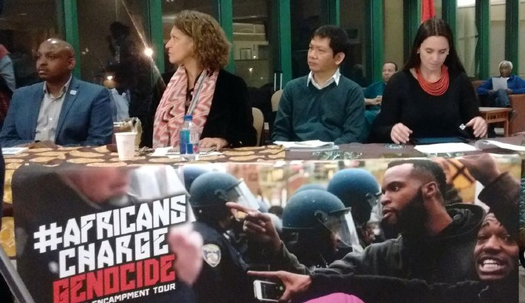
A panel of representatives from the U.N. Working Group of Experts on People of African Descent listen to residents during a session at Chicago State University. Photo: Saidia Therapylady
|
CHICAGO—The demand for reparations for crimes committed against Blacks by federal and local governments grew louder during a two-day United Nations hearing held in Chicago in late January.
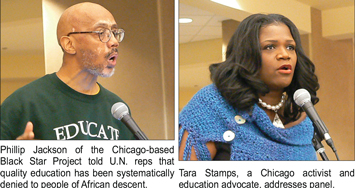
|
Several speakers who packed Chicago State University, a predominately Black school on the city’s South Side ticked off a litany of racial, social and economic disparities they say contributes to the continual disenfranchisement of Blacks living in this country long after the first African slave set foot on the shores of New World more than 400 years ago.
Those disparities included police brutality, high incarceration rates of Black males, economically depressed Black communities riddled with underperforming schools and dwindling mental health and medical resources.
“Every facet of life in this country we are discriminated against … [and] reparation is the remedy,” said Pat Hill, director of Chicago Independent Human Rights Council.
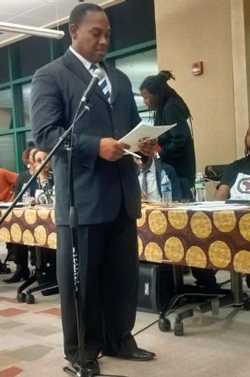
Nation of Islam Student Minister Jeffrey Muhammad, who also serves as co-chair of the Chicago Local Organizing Committee of the Justice Or Else movement, speaks to U.N. panel. Photo: Saidia Therapylady
|
Among the preliminary recommendations the working group presented after the series of community meetings is public acknowledgement of the trans-Atlantic slave trade as a crime against humanity and the establishment of a national human rights commission. The group also recommended reparations for Black Americans.
After finishing their fact-finding mission, the working group was “extremely concerned about the human rights situation of African-Americans,” chair Mireille Fanon Mendes-France of France said in the preliminary report. “The colonial history, the legacy of enslavement, racial subordination and segregation, racial terrorism and racial inequality in the U.S. remains a serious challenge as there has been no real commitment to reparations and to truth and reconciliation for people of African descent.”
Dr. Iva Carruthers, of the Sam-uel Dewitt Proctor Conference, a faith-based social justice group, hoped the report will create a “context of accountability” for U.S. officials both at the local and national levels when it comes to human rights abuses committed in this country.
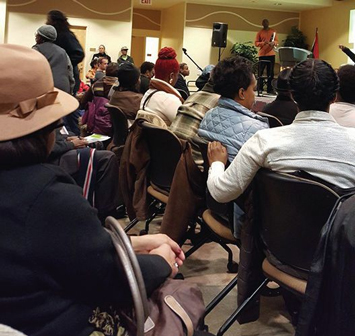
Chicago State University packed with residents during U.N. visit. Photo: Ella Campbell Muhammad
|
Among those human rights violations is the excessive militarization of local police forces, especially in Black communities. Adeyemi Balogun, 33, of Madison, Wisc., knows that first-hand.
“I’ve been roughed up, kidnapped and arbitrarily searched many times by police,” Mr. Balogun said. “My experience is not remarkable, but reflective of the true mission of police in our communities, which is to contain, control and terrorize Black people.”
That’s evident in the fatal police shooting of two Wisconsin residents, Dontre Hamilton and Tony Robinson. Dontre Hamilton, of Milwaukee, was killed in 2014 after a confrontation with a police officer for sleeping in a park. Madison native Tony Robinson was killed in 2015 after friends called police for the 19-year old who was acting erratically after taking hallucinogens. And in Chicago, outrage still continues in the death of 17-year-old Laquan McDonald whose 2014 killing in a hail of bullets by a White Chicago police officer was captured on dashcam video.
“Hyper vigilance and violence towards Black populations in America can only be addressed by empowering Black communities to choose our own forms of community self-defense and public safety,” Mr. Balogun said. “We must have self-determination starting with Black community control over the police in order to stop violence.”
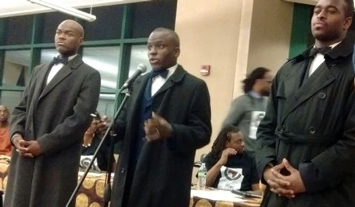
Daniel X (middle) from the Nation of Islam speaks to U.N. panel about disparities facing Blacks in Chicago and nationwide. Photo: Saidia Therapylady
|
“When does my wrong end and my rights begin,” Mr. Lee told the U.N. members.
Even though Mr. Lee holds a master’s degree and has been out of prison for 32 years, there are certain professional licenses he cannot hold. Ex-offenders who have served their time are not restored to full citizenship once released.
They are denied public housing, face employment discrimination, denied federal grants to attend college and in some states lose the right to vote. According to U.S. Justice Department’s Bureau of Justice Statistics, in 2013 more than 600,000 individuals were released from both state and federal prisons.
“The United Nations should push this country to allow those of us who have been out, paid our so call debt to become a protected class,” Mr. Lee said.
Blacks, women, handicapped individuals and gays are a protected class which allows them to sue if they face discrimination, a course of redress ex-offenders do not have, Mr. Lee said, noting that the 13th Amendment “put the nail in the coffin” for ex-offenders. Language pertaining to ex-offenders needs to change, he added.
“It says: ‘No person of U.S. citizenship should be subjected to slavery or indentured servitude unless otherwise convicted of a crime,’” he said. “If someone can discriminate against me because of that conviction, then I am not really out of debt. That’s called collateral consequences. They got policies and laws to support it.”
Activist Tara Stamps wanted U.N. officials to understand the consequences of “educational apartheid” facing children in Chicago’s inner city neighborhoods. She noted the city’s public school system closed 50 schools in mostly poor Black and Latino neighborhoods. The school closures, she said, are a pretext for gentrifying Black neighborhoods.
“This is nothing new. It didn’t start yesterday. Gentrification is real. It’s factual. It’s happening, and it’s a form of genocide,” she said. “Don’t be confused by it. Chicago has been slick in their methods to mask what’s really going on in Black communities under the guise of development.”
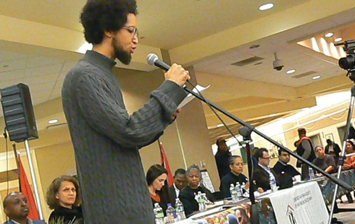
Black people voiced their anger and concerns and also shared personal testimonies with U.N. panel. Photo: LaRisa Lynch
|
To highlight the problem, Mr. Jackson, noted Black boys in Chicago Public Schools read at 7 percent proficient and for Detroit, another metropolis with a large Black population, the rate is even lower at three percent.
“[Education] is a freedom that has consistently, systematically and viciously been denied to people and children of African descent,” Mr. Jackson said.
The U.N. visit grew out of the 2001 World Conference Against Racism held in Durban, South Africa, where member nations were urged to combat racism and discrimination and to call the Transatlantic Slave Trade a crime against humanity. The hearing is also part of the U.N.’s International Decade for People of African Descent from 2015 to 2024. The goal is to underscore the plight of people of African descent, many who live outside the African continent and whose circumstances are often underreported.
When asked the possibility of securing reparations from the U.S. government, host committee member Willie “JR” Fleming, said the American people are already paying for injustices this country commits. He cited the half a billion dollars the city of Chicago paid out in settlements to police misconduct victims and the $5.5 million in reparations doled out to Jon Burge torture victims.
Commander Burge and officers under his authority tortured criminal suspects into making false confessions from the 1970s through the early ‘90s. He later spent four years in prison for lying to federal investigators about the torture.
“I don’t think they [the U.S.] will every spell it out as reparation package but I think the pressure from the world would require such,” said Mr. Fleming, of the Chicago Anti-Eviction Campaign. “The first process to atonement and reconciliation is reparations.”
(The Associated Press contributed to this report.)
INSIDE STORIES AND REVIEWS
-
-
About Harriett ... and the Negro Hollywood Road Show
By Rabiah Muhammad, Guest Columnist » Full Story -
Skepticism greets Jay-Z, NFL talk of inspiring change
By Bryan 18X Crawford and Richard B. Muhammad The Final Call Newspaper @TheFinalCall » Full Story -
The painful problem of Black girls and suicide
By Charlene Muhammad -National Correspondent- » Full Story -
Exploitation of Innocence - Report: Perceptions, policies hurting Black girls
By Charlene Muhammad -National Correspondent- » Full Story -
Big Ballin: Big ideas fuel a father’s Big Baller Brand and brash business sense
By Bryan Crawford -Contributing Writer- » Full Story






 Click Here Stay Connected!
Click Here Stay Connected!








